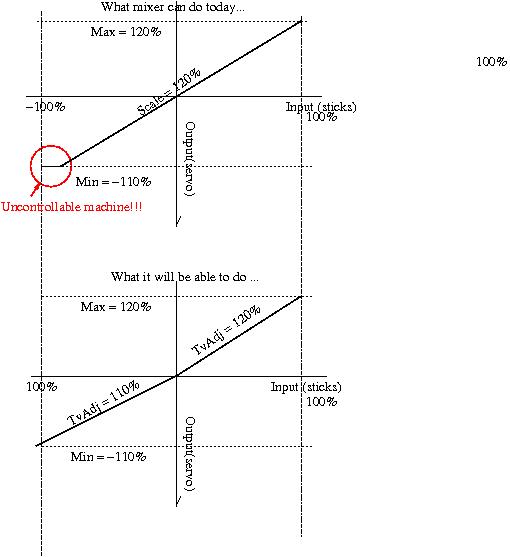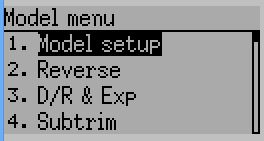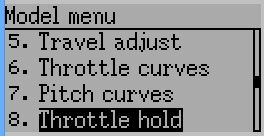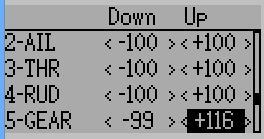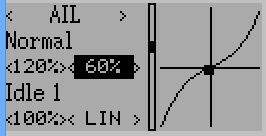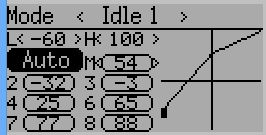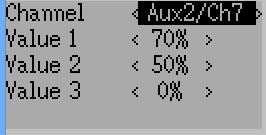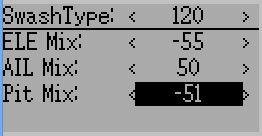- Posts: 20
Channel Scale.... and Travel Adjust
- Flo38
-
- Offline
1/Subtrim (if you mean a bit like trims but more accurate) :
Not the same problem as differential courses.
You may want to trim the servo such that it is aligned with your wing (taking the example of a wing) instead of doing mechanical settings.
Then you have a symmetrical course, with or without trim. If trimming makes the course assymetrical, I think there is a huge problem because trims are always used and after trimming we want in most of the cases a symetrical course.
2/Scale is a good idea in order to scale... Meaning then we use the full scale setting possibilities for dual rate. But, this is the role of travel adj in a normal radio. That mixes scaling AND the possibility to have an assymetrical course.
3/The problem of overdriving servos.
a/As it has been said by domcars0, pilot has here an important checking role.
b/Moreover, if you create both individual travel adj AND ccpm mixing, you ensure to have:
- A regulated course for each servo
- A regulated course for your cyclic pitch
And then Dual Rate is just needed for CCPM mixing (no interest in having an exponential curve on the "x" servos but on the xy combined CCPM movement, as it is already the case)
I hope it is more understandable...
Please Log in or Create an account to join the conversation.
- Muskoka
-
- Offline
- Posts: 31
FDR wrote: Subtrim have to be added last if you don't want it to be affected by other settings.
Imagine: a servo arm is a bit off center, but you cannot adjust it finer, so you set some subtrim, say 2%.
If the scaling would occur after the subtrim applied, changing the scale (or travel adjust if you please), would move the center point.
I have no idea what you guys are talking about, but this I don't agree with. The first thing you do when setting up a flybarless system or any head for that matter is zeroing out the servo arms with subtrim, if required. In a perfect world every servo arm would have the capability of being placed at perfect zero, 90 degrees, that's not the case so you use subtrim. Then you set you travel adjust limits or whatever you choose to call them based on that subtrimmed position / value.
This does not move your "zero" positioning of the servo arm you set with subtrim, it just sets travel limits so you don't have any binding in the head.
What am I missing here, subtrim first, then travel adjustments. Without setting the subtrim first (zeroing your servo arms to 90 degrees) you have no starting point to then set your travel adjustments. To set travel adjust first is just backwards. Your setting limits to a non 90 degree servo arm.
They need to be 90'd first with subtrim, then set your travel limits.
If your talking about something totally different then disregard, but subtrim is always the first servo adjustments.
Please Log in or Create an account to join the conversation.
- domcars0
-
Topic Author
- Offline
- Posts: 390
All my mixers curves are set to 1-to-1 100% offset 0 ...
As you can see .. the values of the TrvAdj SET not only the value of what is called Min/Max limits in the actual release but ALSO the scales!
Devo 10 (+7e) owner. It's mine, please don't touch it with your big fingers
Please Log in or Create an account to join the conversation.
- FDR
-
- Offline
Muskoka wrote:
FDR wrote: Subtrim have to be added last if you don't want it to be affected by other settings.
Imagine: a servo arm is a bit off center, but you cannot adjust it finer, so you set some subtrim, say 2%.
If the scaling would occur after the subtrim applied, changing the scale (or travel adjust if you please), would move the center point.
I have no idea what you guys are talking about, but this I don't agree with. The first thing you do when setting up a flybarless system or any head for that matter is zeroing out the servo arms with subtrim, if required. In a perfect world every servo arm would have the capability of being placed at perfect zero, 90 degrees, that's not the case so you use subtrim. Then you set you travel adjust limits or whatever you choose to call them based on that subtrimmed position / value.
This does not move your "zero" positioning of the servo arm you set with subtrim, it just sets travel limits so you don't have any binding in the head.
What am I missing here, subtrim first, then travel adjustments. Without setting the subtrim first (zeroing your servo arms to 90 degrees) you have no starting point to then set your travel adjustments. To set travel adjust first is just backwards. Your setting limits to a non 90 degree servo arm.
They need to be 90'd first with subtrim, then set your travel limits.
If your talking about something totally different then disregard, but subtrim is always the first servo adjustments.
Yep, we actually agree on this, just you are talking about the order of configuration, while I wrote about the order of the algorythm in the fw...
Please Log in or Create an account to join the conversation.
- domcars0
-
Topic Author
- Offline
- Posts: 390
You are right Muskoka, pilot setup FIRST subtrim , then TrvAdj etc ...Muskoka wrote: If your talking about something totally different then disregard, but subtrim is always the first servo adjustments.
But the computer (your TX) make that in the reverse order ... it applies subtrim at the end, that what FDR says.
Devo 10 (+7e) owner. It's mine, please don't touch it with your big fingers
Please Log in or Create an account to join the conversation.
- rangebound
-
- Offline
- Posts: 4
Try this on a Wk2801 or spektrum DX6 or any similar Tx
Set rudder travel adjusts to min= 130 max =90
Look in the monitor and you get :
-130 when the stick is FULL left.
+90 when the stick is FULL right.
If you try to acheive the same with deviation you cant. The closest you can get is :
Scale = 130
Min = -130
Max = 90
But the result as viewed in the monitor is :
-130 when the stick is FULL Left
90 BEFORE the stick hits full right
Min and Max still may have a use in some applications -though they are somewhat redundant due to the Min and Max Mux types in the complex mixer - but if they remain it would be good to have an INHIBIT option on them.
Please Log in or Create an account to join the conversation.
- Muskoka
-
- Offline
- Posts: 31
Please Log in or Create an account to join the conversation.
- domcars0
-
Topic Author
- Offline
- Posts: 390
peute peute Flo38Flo38 wrote: 1/Subtrim (if you mean a bit like trims but more accurate)
subtrims are NOT manipulate by any mixer/swashmix calculation, trims yes ... But this is not our problem here
Devo 10 (+7e) owner. It's mine, please don't touch it with your big fingers
Please Log in or Create an account to join the conversation.
- FDR
-
- Offline
Muskoka wrote: Guess I don't understand what your talking about. Still stands though that whether I'm making external adjustments, or the software is "computing" my adjustemnts, the computation of a 90 degree servo arm has to be the very first thing thats caluculated, not travel adjust limits. If the software / fw is making subtrim adjustments after travel adjust limits are set, that's wrong / backwards. Am I still not seeing this correct? I'm not a programmer, so be kind...please.
The point is that the subtrim is on offset correction: the servo might need a constant offset to be centered at zero input.
It is not calculated, it's constant. It is the only value, which doesn't depend on inputs.
The servo will need that constant offset value whatever way the output is calculated before, that offset shouldn't be changed by any calculation, so it is added last to the output value by the fw.
Please Log in or Create an account to join the conversation.
- Flo38
-
- Offline
- Posts: 20
I was talking about that in order to understand FDR's solution.
But the problem is also well explained in domcars0's picture.
Please Log in or Create an account to join the conversation.
- vlad_vy
-
- Offline
- Posts: 3333
Please Log in or Create an account to join the conversation.
- Hexperience
-
- Offline
- Posts: 588
FDR wrote: The point is that the subtrim is on offset correction: the servo might need a constant offset to be centered at zero input.
It is not calculated, it's constant. It is the only value, which doesn't depend on inputs.
The servo will need that constant offset value whatever way the output is calculated before, that offset shouldn't be changed by any calculation, so it is added last to the output value by the fw.
Ah, now I see what you are getting at. The question is, in the mixer order in the code, does subtrim alter the value, then is value used in the next calculation.
value = 0 (stick at center)
subtrim = 10
value = value + subtrim
value = expo(value) So here we run our expo functions based on +10
value = rate(value)
etc.
OR
value = 0
value = expo(value) Here we run expo based on 0 so the center of the curve is zero
value = rate(value)
{at this point value may not be 0}
value = value + subtrim (Now our subtrim get applied and in effect changes the center of the expo curve.)
Obviously there is no expo(value) function, but I hope you see what I'm getting at.
All I know is it's a lot of fun trying to figure this out!
There are 10 types of people in this world. Those that understand binary and those that don't.
Please Log in or Create an account to join the conversation.
- Hexperience
-
- Offline
- Posts: 588
vlad_vy wrote: Why not use 3-point curve? Scale = 120%, 1-point = -92%, 2-point = 0%, 3-point = +100%. It's equal -110% - 0% - +120%.
Bingo!
LOL... you know for every problem there is a solution, and every solution there is a problem.
That's why I love custom firmware... there's always a way to make it do what you want.
There are 10 types of people in this world. Those that understand binary and those that don't.
Please Log in or Create an account to join the conversation.
- suvsuv
-
- Offline
- Posts: 268
I already implement a Walkera/JR like Mixer GUI for devo10. To support asymmetry travel adjust, the current servoscale must be broken into 2 parameters: servoscale and servoscaleneg. You can check out detail implementation from the following repo for the new Mixer GUI.Flo38 wrote: I know how to set trims and subtrims. I just means there were not much differences I think... Subtrims could just be more accurate and not changed over the air with buttons...
I was talking about that in order to understand FDR's solution.
But the problem is also well explained in domcars0's picture.
bitbucket.org/sunvsuv/devil10
Please Log in or Create an account to join the conversation.
- domcars0
-
Topic Author
- Offline
- Posts: 390
vlad_vy : I know that it's possible to implement the curve from my picture with the actual mixer, the issue is not here ....vlad_vy wrote: Why not use 3-point curve? Scale = 120%, 1-point = -92%, 2-point = 0%, 3-point = +100%. It's equal -110% - 0% - +120%.
Imagine now that I want EXP/DR curves (not 1-to-1) or complexe.. with the same scales and Min/Max... how can I do that easily? Yes it's possible with 13Pts curves but my brain is not a Cray
Devo 10 (+7e) owner. It's mine, please don't touch it with your big fingers
Please Log in or Create an account to join the conversation.
- domcars0
-
Topic Author
- Offline
- Posts: 390
Humm... very interesting ... I will have a look.. thanks Suvsuvsuvsuv wrote: I already implement a Walkera/JR like Mixer GUI for devo10. To support asymmetry travel adjust, the current servoscale must be broken into 2 parameters: servoscale and servoscaleneg. You can check out detail implementation from the following repo for the new Mixer GUI.
bitbucket.org/sunvsuv/devil10
Devo 10 (+7e) owner. It's mine, please don't touch it with your big fingers
Please Log in or Create an account to join the conversation.
- Hexperience
-
- Offline
- Posts: 588
In the er9x mixer Weight is what we call scale in deViation. Also notice the options for trim and flightmode trim.. (Wish I knew er9x better to understand exactly what they mean here).
What they also have is Rates for both positive and negative.
In what order all this is calculated is the second part of the issue at hand. And of course I have no idea...
*** Standard disclaimer: I, in no way, am saying deViation should be the same as er9x, nor am I saying deViation is in any way inferior to any other custom firmware. I would like to thank PB and everyone involved with deViation for their hard work and commitment. ***
There are 10 types of people in this world. Those that understand binary and those that don't.
Please Log in or Create an account to join the conversation.
- vlad_vy
-
- Offline
- Posts: 3333
domcars0 wrote:
vlad_vy : I know that it's possible to implement the curve from my picture with the actual mixer, the issue is not here ....vlad_vy wrote: Why not use 3-point curve? Scale = 120%, 1-point = -92%, 2-point = 0%, 3-point = +100%. It's equal -110% - 0% - +120%.
Imagine now that I want EXP/DR curves (not 1-to-1) or complexe.. with the same scales and Min/Max... how can I do that easily? Yes it's possible with 13Pts curves but my brain is not a Cray
It's possible, but 3-point curve will be different (always positive). Scale=120%, Complex mix (4 pages) -> EXPO curve 1 (Mux:replace) -> EXPO curve 2 (Mux:replace) -> EXPO curve 3 (Mux:replace) -> 3-point curve (+92% - 0 - +100%)(Mux:mult).
Please Log in or Create an account to join the conversation.
- domcars0
-
Topic Author
- Offline
- Posts: 390
It crash also when I want to change the Mixer Gui <Advanced> ... a dialog box open 'Not a traditional model, reset it' , emu crash if I click 'OK' (same error "buffer overflow detected").
I compile on linux
Devo 10 (+7e) owner. It's mine, please don't touch it with your big fingers
Please Log in or Create an account to join the conversation.
- Hexperience
-
- Offline
- Posts: 588
rangebound wrote: Domcars is right its all about the Asymetry of the output on the sticks
Try this on a Wk2801 or spektrum DX6 or any similar Tx
Set rudder travel adjusts to min= 130 max =90
Look in the monitor and you get :
-130 when the stick is FULL left.
+90 when the stick is FULL right.
If you try to acheive the same with deviation you cant. The closest you can get is :
Scale = 130
Min = -130
Max = 90
But the result as viewed in the monitor is :
-130 when the stick is FULL Left
90 BEFORE the stick hits full right
Min and Max still may have a use in some applications -though they are somewhat redundant due to the Min and Max Mux types in the complex mixer - but if they remain it would be good to have an INHIBIT option on them.
If you have a LIMIT it SHOULD stop BEFORE the stick hits full right, to have it go all the way you would set it as a RATE.
Or maybe I've got it all wrong... my head hurts. I need a break. (Back to work)
There are 10 types of people in this world. Those that understand binary and those that don't.
Please Log in or Create an account to join the conversation.
-
Home

-
Forum

-
News, Announcements and Feedback

-
Feedback & Questions

- Channel Scale.... and Travel Adjust

